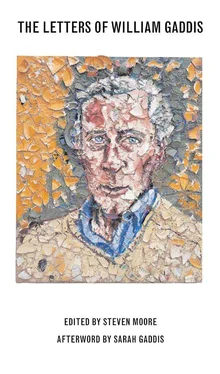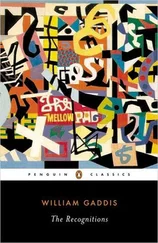love
W.

sunt lacrimae rerum: a phrase from Virgil’s Aeneid ( ODQ ).
Si ça c’est la morte, ce n’est pas drole: “If this is death, it isn’t funny.”
Pompidoux people: the Centre Georges Pompidou, a cultural complex.
a new agent: Andrew Wylie.
Life is what happens […] other plans: usually ascribed to John Lennon (from his 1980 song “Beautiful Boy”) but since it appears on p. 486 of J R , either the ex-Beatle got it from WG or (more likely) they both found it elsewhere.
Hemingway […] few survive it’: another one of Jack Gibbs’s epigraphs ( J R 486) but untraced.

To Larry M. Wertheim
[ A lawyer (Kennedy & Graven) and adjunct professor of law at William Mitchell College of Law in Saint Paul, Minnesota. He sent WG a copy of his essay “Law as Frolic: Law and Literature in A Frolic of His Own ,” William Mitchell Law Review 21.2 (1995): 421–56, to which the page numbers below refer. ]
East Hampton, NY 11937
12 March 1996
Dear Larry Wertheim,
(predictably) failing best cellardom, the time effort hopes &c that go into a piece of work like this last frolic of mine may however rarely provoke rewards a good deal more substantial than Today Show celebrity & this law review article of yours certainly ranks. It is a delight to me in its seizures on detail & nuance, width of its grasp & peripheral reading both in my earlier work & elsewhere & I suppose paramount to the novelist (or should be) believing & feeling for the characters.
That said, running through it item by item as they leap forth, in fact (423) despite reviews headlined Scathing Indictment of Law & Lawyers in the current mode, it’s been more warmly & happily embraced by lawyers which of course I’d intended & hoped for.
Your mention (425) that ‘the plot can largely be retold as a series of lawsuits’ recalls an initial notion I had of making it simply that, no narrative dialogue &c but the story emerging from an entanglement of complaints depositions brief[s] &c which thank heavens I abandoned, already stigmatized as ‘difficult’ as I am.
Curiously (427, 438, 443) the Eugene O’Neill entry was kind of a post hoc affair. I’d long since worked out the substitute/self murder equation, & even such details as the stiff father/major a judge, the cheek scar/head wound &c &c; then late along the way reread the O’Neill play which I (like Oscar) found contrived awkward stilted & altogether pretty bad BUT was honestly really startled at the correspondencies (‘substantial similarities’) with my tale: unconscious plagiary (but still culpable?) that Hand mentions? Because I had written papers in college & diagramed O’Neill/Greek drama/Freud. And then at the last minute it occurred to me that obviously the O’N. estate would sue Oscar & even, once the deed was done, wondered if (in ‘real life’) they would sue me. And so (443) while Oscar’s homage apologia embraces Plato I don’t think I meant it to O’Neill.
Regarding (428) the Episcopal/Pepsico suit: I’d originally intended it to be a prominent, if ancillary, feature of the book & had-&-have collected the vast amount of ammunition for this reductio-ad-absurdum version of rendering unto Caesar &c but was finally so overwhelmed by this additional prospect (as also realizing I could push the reader just so far) that I finally escaped it as the ‘lost’ brief at the end but God knows if I’m around for long enough it may yet surface as so rich with implications for our ridiculous times.
(Incidentally: for the sort of small prank I sometimes cannot resist & to keep my interest from flagging, I doubt any reader noted but picture his treat if he did, the confusion of the young lawyer & the lost brief (446) over the 2 Harrys (“That’s not the Harry I knew” Frolic paper ed. 506) harks back to the rather salacious exchange between Christina & Basie (id. 107 & 206) regarding the hairy Ainu, which finally sends Christina over the edge.) And speaking of Mr Basie I meant him as a man with a good deal of dimensions, cunning & compassion, saves Oscar from himself as it were, & ‘living’ parallel to the finally hunted down John Israel in the play.
Oscar’s lawsuit was well in (my) hand researched, outlined, determined outcome &c some time before Buchwald (434) & (as you note) distinct from it as breach of contract rather than plagiary though I did at the end pick up from Buchwald the ‘creative accounting’ details for Oscar’s ‘pyrrhic victory’ (444). (Incidentally I believe Paramount even had the gall to claim that the ‘idea’ for that really lousy movie was EMurphy’s.)
In light of the above & all of your marvelous insights, summation & care I hate to point out that it is Tatamount (id.29) not Tantamount (426) & not Frickert (428) but Fickert (id.373) I believe I stole from an old routine of Jonathan Winters. Ah, but a man’s reach should exceed his grasp, or what’s a heaven for?
My thanks to you again, with warm regards
William Gaddis

the O’Neill play: Mourning Becomes Electra (1931), based loosely on the Oresteia of Aeschylus. Oscar’s lawyer Basie calls it “a clumsy warmed over schoolboy parody of Euripides with a few vulgar Freudian touches thrown in for good measure” ( FHO 96).
Buchwald […] EMurphy’s: as noted earlier (first letter of 21 January 1990), Eddie Murphy’s Coming to America was the subject of a lawsuit brought by journalist Art Buchwald. Jonathan Winters: one of the stand-up comedian’s many personas was a grouchy old woman named Maude Frickert [ sic ], a recurring character on The Jonathan Williams Show (CBS, 1967–69).
Ah […] for?: the most quoted line from Robert Browning’s poem “Andrea del Sarto” (1855).

To Thomas Überhoff
[ Editor at Rowohlt Verlag who was overseeing Nikolaus Stingl’s German translation of FHO ( Letzte Instanz, 1996 ). In a rare explication of his own prose, WG attempts to untangle a long sentence on page 304 as Oscar nods off while watching a television nature program on
a lackluster member of the Cistaceae or rockrose family, Helianthemum dumosum, more familiarly known in its long suffering neighborhood as bushy frostweed for its talent at surviving the trampling by various hoofed eventoed closecropping stock of the suborder Ruminantia, to silently spread and widen its habitat at its neighbors’ expense like some herbal version of Gresham’s law in Darwinian dress demonstrating no more, as his head nodded and his breath fell and the crush of newsprint dropped to the floor, the tug at his lips in the troubled wince of a smile might have signaled no more than, or better perhaps the very heart of some drowned ceremony of innocence now the worst were filled with passionate intensity where — we share something then don’t we, no small thing either [Basie had told Oscar earlier] — That’s good to know, demonstrating simply the survival of the fittest embracing here in bushy frostweed no more than those fittest to survive not necessarily, not by any means, by any manner of speaking, the best […].
Читать дальше














